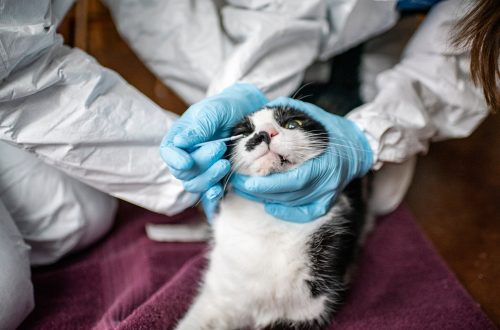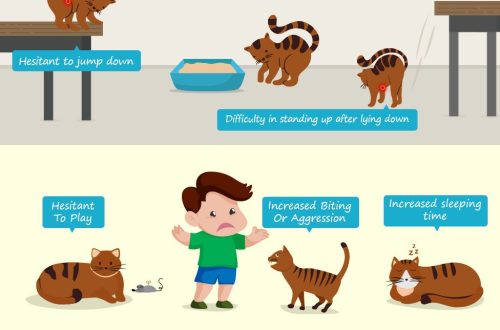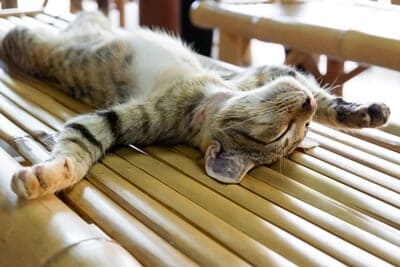
Why does the cat lie or sleep on its back?

Contents
Reasons why a cat lies on its back
There are a number of reasons why animals may assume the supine position. In the vast majority of cases, this posture speaks only about the behavior or habits of each particular cat. For example, when a cat sleeps on its back, and there is no more comfortable position for it than this one.
Only in rare cases, it can suggest the presence of health problems in the pet. It is also important to understand that if there is a problem, then it is extremely unlikely that only an unusual body position will be observed from the symptoms. There will likely be more complaints.
Sleep position
Of course, this is not the most typical sleeping position for cats, as most often they curl up into a ball or stretch on their side. However, some representatives of the species prefer this position. Small kittens can often sleep on their backs, in adult animals this is much less common. In general, this posture in cats indicates maximum relaxation and complete immersion in deep sleep, which is only possible if the pet is comfortable in its surroundings.
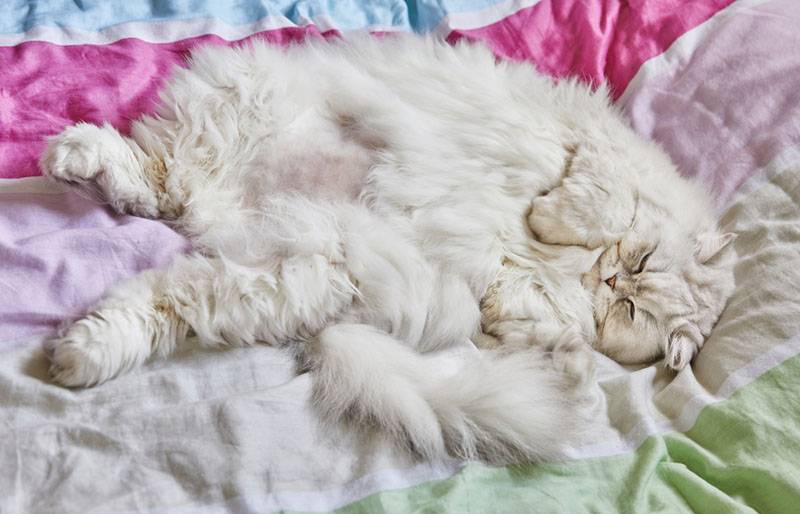
Confidence
Being in a familiar environment with familiar people, the pet, as a rule, feels safe, so cats can lie or sleep on their backs. Of course, the character of each individual pet also plays a role in the issue of trust. There are cats who, even having lived all their lives side by side with a person, remain suspicious and non-contact.
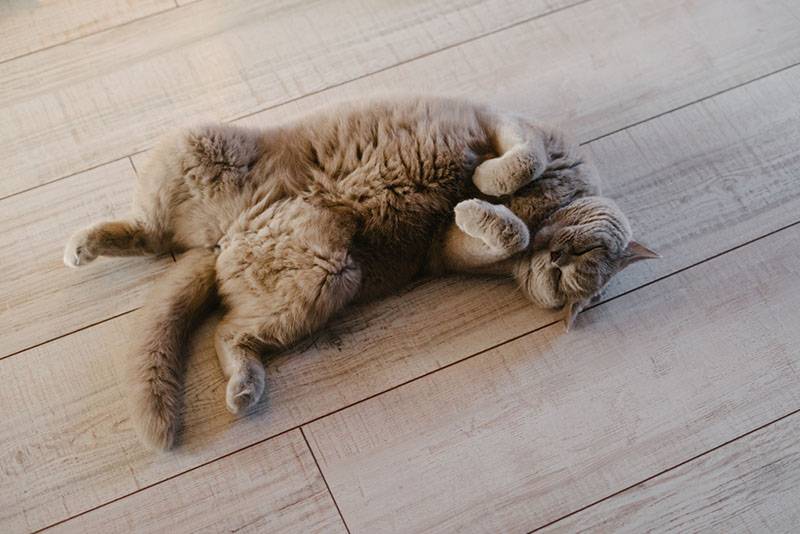
Species-Specific Behavior
In the process of playing with a cat with a hand or some toy, it often clings to an object with four paws and bites. Such a hunt for a “victim” occurs, as a rule, when the cat lies on its back. The tail in such a game of a hunter usually moves uncontrollably and sharply, the ears can be pressed to the head, the whole posture expresses readiness for attack or defense, if necessary.
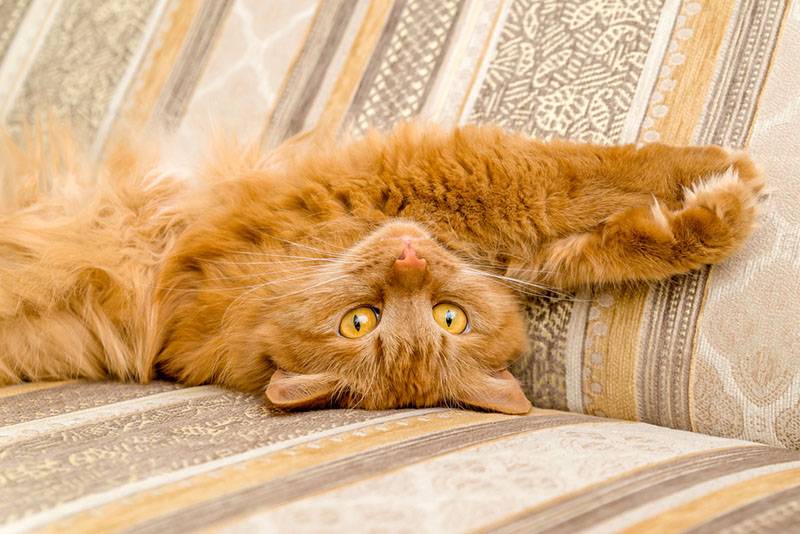
Body cooling
Normal body temperature in cats is higher than human norm. If the room where the animal is kept is poorly ventilated, hot, stuffy, then the cat will cool its body in all the various ways available to it. Lying on its back, spreading its paws in different directions, exposing the belly, where there is little hair, the cat tries to cope with the heat.
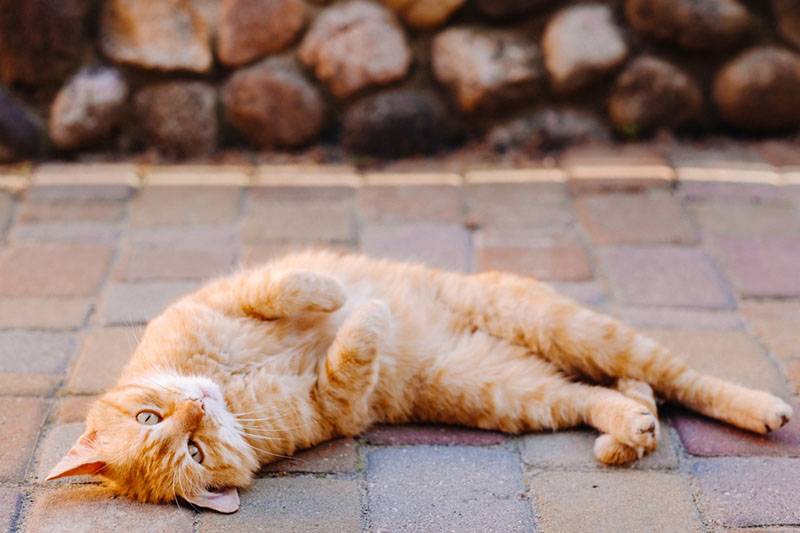
sexual behavior
During the period of sexual hunting (estrus), all cats change in behavior, become more affectionate, contact, begin to constantly rub against the owner’s legs and other objects, and purr obsessively. Cats can arch their backs, roll on the floor, including on their backs. This is what females do when they try to attract a mating partner.
Overweight
Unfortunately, most cats living in apartments are overweight, which puts extra stress on their joints. Fat cats can lie on their backs with their hind legs spread because this position is comfortable for them and also allows them to rest their paws and sleep more easily.
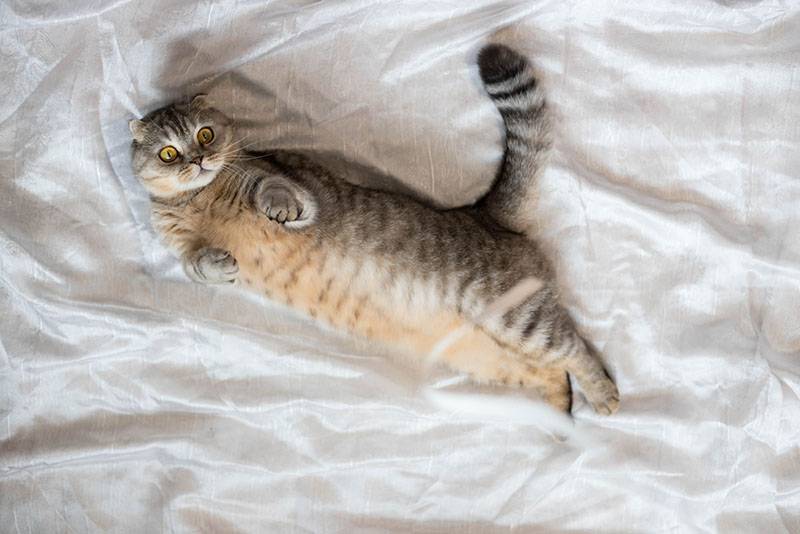
Itching
In a healthy cat, the coat is smooth, shiny, firmly held in the follicles, the coat itself is not tousled, without dandruff. Most dermatological problems in animals will be accompanied by itching. If you can’t reach the itchy area with your tongue and teeth, the cat may rub its back against the floor in the hope of coping with discomfort.
Another symptom of dermatological problems, and sometimes a direct consequence of severe itching, are alopecia – areas of baldness. These may be large areas without hair, or there may be local alopecia, symmetrical or not – it all depends on the cause that caused the itching. In some cases, owners may notice redness and increased local temperature in affected skin areas.
The most common cause of the symptoms described are flea bites, while the parasites themselves may not be found on the pet’s body. Therefore, it is important to timely and regularly treat cats from ectoparasites, even those that never leave the apartment. Other causes also lead to itching: bacterial infections, allergies, etc.
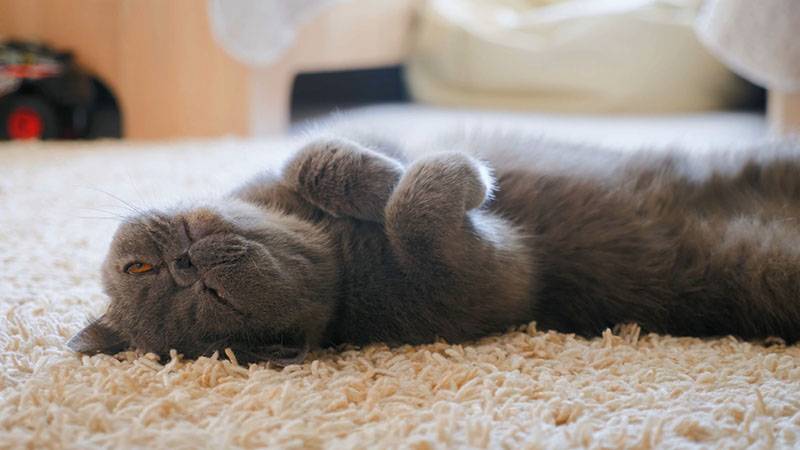
Other ailments
It is important to note that the position in which a small kitten or an adult animal lies on its back is generally not an unambiguous symptom of any disease. The animal’s appetite, activity, defecation, urination, etc. are usually of the greatest interest to both owners and doctors.
If the pet becomes restless, cannot find a place to itself, meows often and loudly, eats less often or completely refuses to eat, cannot go to the toilet or does it too often if he has vomiting, diarrhea, sneezing, coughing, shortness of breath and other deviations uncharacteristic for the pet, it is necessary to get a face-to-face consultation with a veterinarian to clarify the situation.
Elderly cats often develop joint pain and various problems with the spine.
If the habit of rolling on your back suddenly appeared in your pet, it may be worth making an appointment with a veterinarian. Especially if, in addition to a change in the position for sleeping and resting, there is heavy breathing, lameness, unwillingness to move. A sick animal may not allow itself to be touched, and when trying to touch it, it suddenly begins to respond with aggression.
When contacting a veterinary clinic, it can be very useful to have photographs or videos of what exactly in the postures and behavior of the cat began to bother you.
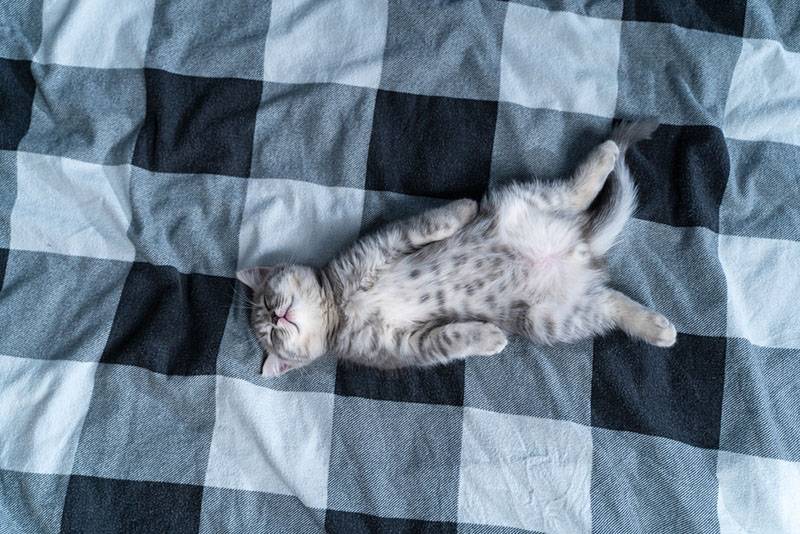
The cat lies or sleeps on its back – the main thing
Most of the reasons why animals can take a position on their backs absolutely do not pose any danger to the health of the pet.
In cats, the supine position is usually not an unambiguous sign of any disease.
If you suspect health problems, you should first of all pay attention to the activity, appetite of the pet, urination, defecation, etc.
Sleeping on the back is most common for kittens. Adult cats sleep on their backs less often. However, this posture is the absolute norm.
Animals can lie on their back or rub it on the floor and other surfaces in the presence of itching, which occurs with dermatological problems (parasites, allergies, etc.).
Rolling onto the back is typical for cats during estrus, at the time of the game or when aggression is manifested.
Answers to frequently asked questions
Sources:
Glazunova L. A., Tkacheva Yu. A. “Comparative efficacy of drugs for flea infestation of dogs and cats”, Veterinary doctor, 2017
Smirnova O. “An endocrinologist’s view of the problem of overweight in cats and dogs”, Zooinform veterinary medicine, 2021
Parker R. «Why Do Cats Sleep On Their Backs?» // https://www.seniorcatwellness.com/why-cats-sleep-on-their-backs/
Kerwin S. C. «Osteoarthritis in cats», Top Companion Anim Med, 2010 г.



